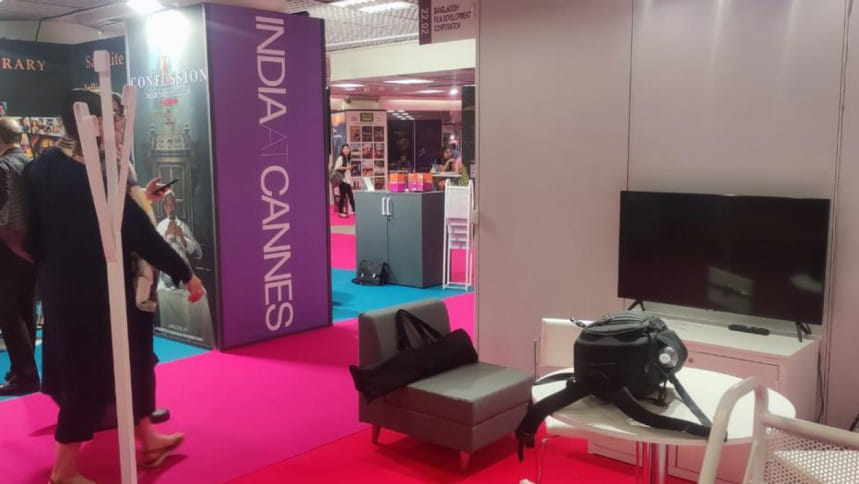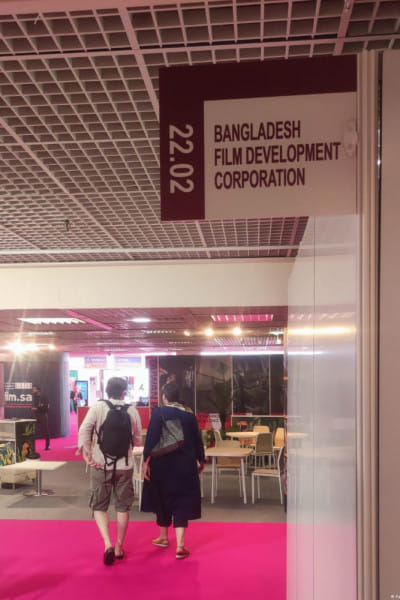Embarrassment for Bangladesh as Cannes stall remains empty

The journey of Bangladeshi cinema at the Cannes Film Festival took an unexpected turn this year, marked by delays, visa issues, and missed opportunities. The anticipation surrounding Bangladesh's participation in the renowned festival, fuelled by recent successes, would eventually be met with frustration and disappointment.
In 2002, Tareque Masud's film "Matir Moina" received accolades, winning the prestigious 'FIPRESCI' award at the Directors' Fortnight section at Cannes. Fast forward almost two decades, and Abdullah Mohammad Saad's movie "Rehana Maryam Noor" made a remarkable impact at the 74th edition of the Cannes Film Festival in 2021. The film, starring Azmeri Haque Badhan, competed in the esteemed "Un Certain Regard" category, symbolising a significant milestone in the history of Bangladeshi cinema.
With the celebration of Bangladesh's golden jubilee of independence, the hopes and possibilities of the country's film industry soared. The promise of showcasing Bangladeshi films to the world was expressed by the Information and Broadcasting Minister, Dr Hasan Mahmud, MP, during the trailer release of Shyam Benegal's "Mujib: The Making of a Nation" at the Indian Pavilion, ahead of the 75th edition of the festival.
In preparation for this year's festival, the Bangladesh Film Development Corporation (BFDC) secured a stall in the Film Market section of the 76th edition of Cannes. However, the process of finalising the list of delegates caused numerous challenges. The long list of attendees, including BFDC officials, raised suspicions about the motive behind their selection and sparked concerns about potential financial implications.
Reportedly, complications over receiving the permission order from the government had delayed representatives from applying for the visa. Later, with the special initiative of the Ministry of Foreign Affairs, and with the arrangement by the Ministry of Information and Broadcasting they faced the embassy.
Saiful Islam, Deputy Secretary of the Ministry of Information and Broadcasting, expressed concerns about the unusual length of the list and raised doubts about whether all the selected individuals would return home from Cannes.
A director from the Bangladesh Film Development Corporation (BFDC), speaking anonymously, shed light on the situation, suggesting that the lengthy list was a means to generate funds for attending the festival. The alleged scheme involved registering many others as "sponsors" of BFDC officials.

Amidst the turmoil, the intervention of the Information Minister resolved the crisis, and a revised list of six individuals, including three BFDC officials, actor Zayed Khan, and director Mushfiqur Rahman Gulzar, was sent to the Prime Minister's office on the eve of the festival.
The Cannes Film Festival commenced on May 16, and despite the enthusiasm surrounding the Bangladeshi booth in the 'Marche Du Film' (Film Market) the delegation faced an unexpected setback. Visa applications for the approved individuals were denied due to a 'shortage of time' at the French Embassy, leaving the delegation without the necessary travel documents.
As a result, the representative booth became a poignant reminder of the missed opportunities for Bangladeshi films. Aranya Anawer's film "Maa", featuring Pori Moni, stood as the sole representative of Bangladeshi cinema in the 'Marche Du Film'. The director and one of the producers, Pulak Kanti Barua, tried to promote the film by adorning the booth with banners and posters. However, the absence of an official delegation raised questions and dampened the spirits of foreign journalists and film enthusiasts.
The film "Maa" had its screening scheduled at the festival's mini-theater, "Pale E," on the fifth day. Yet, the presence of Bangladeshi film-related personnel dwindled, and promotional materials were removed from the booth, leaving a void and a missed opportunity for broader exposure.
The mismanagement and lack of coordination in organising the Bangladeshi delegation at Cannes have drawn criticism from film activists and industry insiders. This unfortunate turn of events highlights the need for better planning and communication within the Bangladeshi film industry to seize future opportunities on the international stage.
After the curtain falls on this year's Cannes Film Festival, the aspirations of Bangladeshi cinema remain unfulfilled, reminding stakeholders of the importance of unity, efficient management, and effective representation for future endeavours.

 For all latest news, follow The Daily Star's Google News channel.
For all latest news, follow The Daily Star's Google News channel. 













Comments